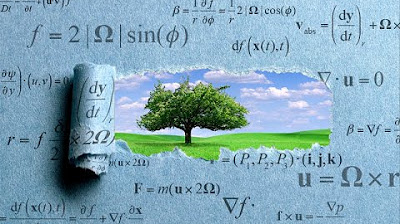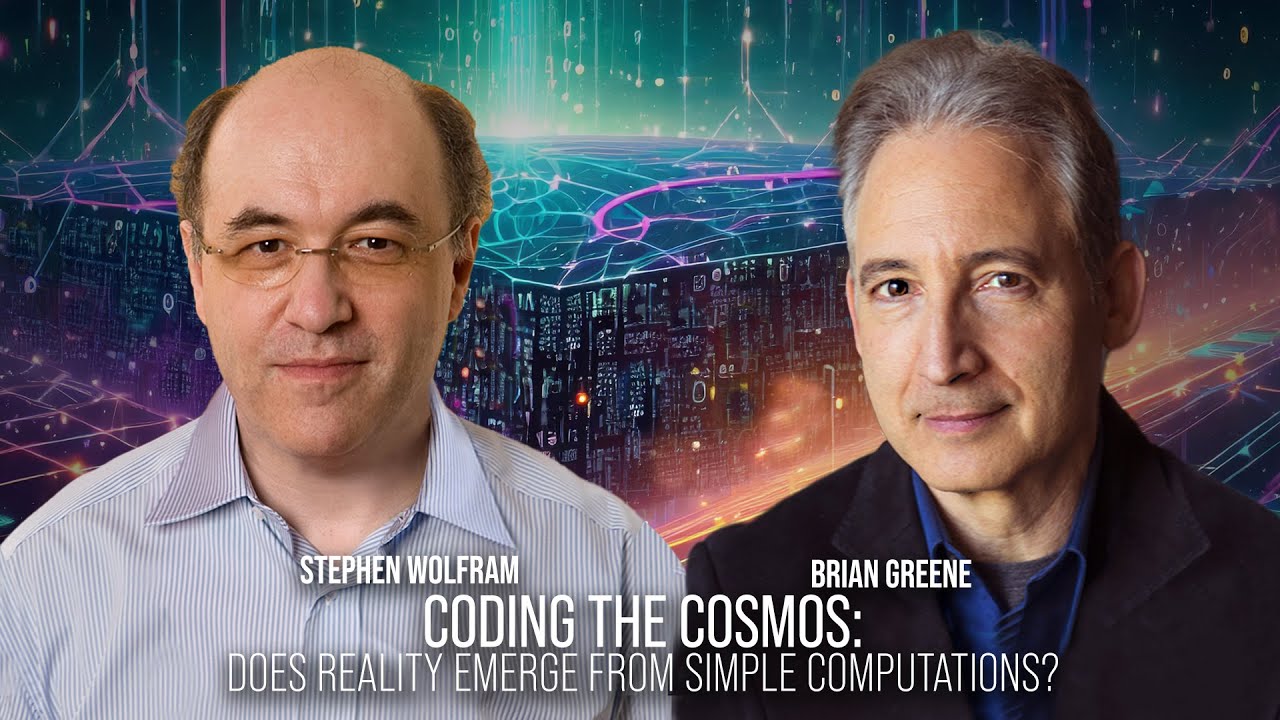Our Mathematical Universe: Brian Greene & Max Tegmark
TLDRIn a dynamic live session hosted by the World Science Festival, viewers are taken on an intellectual journey from the picturesque fields of upstate New York to the bustling streets of Manhattan, the new backdrop for future broadcasts. The session delves into the fascinating intersection of mathematics and reality, inspired by previous discussions and audience curiosity. Highlights include a deep dive into whether math is a fundamental reality or a human invention, with insights from notable thinkers like Max Tegmark. The conversation spans from the universe's mathematical underpinnings to the enigmatic nature of consciousness, culminating in a thought-provoking dialogue on the limits and possibilities of understanding our world through mathematics.
Takeaways
- 😀 Max Tegmark believes that mathematics is fundamental to reality; our universe may consist purely of mathematical structures
- 😯 Tegmark sees a historical trend towards greater humility as we learn more; accepting parallel universes makes us less self-important
- 🤔 Brian Greene feels strongly that math is an invention of the human mind, not an external reality we discover
- 😮 Greene argues that thinking all mathematical structures exist is the opposite of humility - we're overvaluing our mental constructs
- 🧐 Tegmark and Greene discuss Gödel and whether math has inherent limitations that constrain its applicability to reality
- 😀 Consciousness is an exciting unsolved mystery - could subjective experience arise from particular arrangements of particles?
- 🤔 David Chalmers argues consciousness cannot emerge from unconscious components - Tegmark disagrees
- 😀 Tegmark and Greene are enthused by increasing scientific respectability of consciousness studies
- 🤨 Could future AI systems have real subjective experiences like humans do? Important open question.
- 😊 Tegmark and Greene have nuanced perspectives but enjoy discussing their differing views in a constructive way
Q & A
What is the primary focus of the World Science Festival?
-The World Science Festival focuses on bringing scientific discussions and educational sessions to the public, featuring conversations on various topics like mathematics, reality, language, and consciousness.
Why has the background of the live sessions changed recently?
-The background has changed because the sessions are now being broadcast from the 19th floor of the Interchurch Center in uptown Manhattan, which is the headquarters of the World Science Festival, indicating a shift in location from the speaker's home in upstate New York.
What was the topic of the first program created in a virtual environment by the World Science Festival?
-The first virtual program was titled 'Does Math Reveal Reality', which involved a discussion on the nature of mathematics and its relationship to reality.
Who were some of the participants in the upcoming program on language and thought?
-Participants included Noam Chomsky, Stephen Pinker, Evelina Federenco, and Daniel Dor, who discussed the origins of language, its role in human cognition, and its relationship with thought.
What perspective did Max Tegmark bring to the conversation on mathematics and reality?
-Max Tegmark defended the idea that the universe is fundamentally mathematical, arguing that all properties of physical objects and space itself can be described mathematically, suggesting a deep connection between mathematics and the fabric of reality.
How does the speaker differentiate between mathematical description and the existence of physical objects?
-The speaker suggests that while mathematics provides a precise language to describe physical phenomena, there is a fundamental difference between the descriptive power of mathematics and the actual existence of objects, which possess an inherent quality of 'being' beyond their mathematical properties.
What is the 'mathematical universe hypothesis' proposed by Max Tegmark?
-The mathematical universe hypothesis posits that the physical universe is not just described by mathematics, but it is fundamentally mathematical in its nature, implying that all structures that exist mathematically also exist physically.
How did the conversation address the concept of consciousness in relation to physics and mathematics?
-The conversation explored the idea that consciousness and intelligence might be forms of information processing that could potentially be described mathematically, raising questions about the nature of consciousness as an emergent phenomenon from physical processes.
What role does Gödel's incompleteness theorems play in the discussion on mathematical structures and reality?
-Gödel's incompleteness theorems challenge the notion of finding a complete and consistent set of axioms for mathematics, raising questions about the limits of mathematical structures in fully describing or encompassing the complexity of the physical universe.
How does the conversation envision the future of artificial intelligence in relation to human consciousness and experience?
-The conversation speculates that advanced artificial intelligence could potentially replicate or even possess consciousness, raising ethical and philosophical questions about the nature of consciousness in AI and its implications for human understanding of intelligence and experience.
Outlines
😀 Introducing the video and speakers
Brian Greene welcomes viewers to a live session brought by the World Science Festival. He notes that he is broadcasting from New York City, rather than his usual home studio backdrop. Brian provides context that this video builds on a previous discussion about whether math reveals reality. He previews that this session will focus on Max Tegmark's perspective on that topic.
🌟 Overviewing upcoming programs
Brian advertises upcoming virtual World Science Festival programs: one on language with various speakers like Noam Chomsky and Stephen Pinker on September 16, and one on cosmology with Alan Guth and Andrei Linde. He requests creative title ideas for the language program from the audience.
😄 Introducing Max Tegmark
Brian introduces his guest Max Tegmark. Max shares about his childhood and early interest in big questions, leading him to study physics and cosmology. He ended up doing grad school in California. Max recounts how he became fascinated by the biggest questions about the origins and size of our universe.
🧠 Max's research exploring inner and outer worlds
Max summarizes his career trajectory, spending 25 years focused outwardly on physics and cosmology. In the last 5 years, his research has shifted inward to studying intelligence and consciousness with his MIT group on artificial intelligence. He sees math as able to conquer new domains like the mind previously thought impossible to describe mathematically.
🤔 Audience questions on math, physics and complexity
Brian takes some audience questions. One asks if physics laws have gotten more complex over time. Max responds they've oscillated between simple and complex in cycles. Brian agrees we're good at finding elegance, expecting an ultimate simple theory. Another asks if humans can definitively determine the mathematical structure of reality. Max thinks it's unknown if we'll fully crack it.
🔭 Defining Max's mathematical universe hypothesis
Brian checks his understanding of Max's view - that all mathematical structures exist in reality across a multiverse landscape. Max confirms this controversial idea, which he argues avoids needing any special 'magic' to make one math structure real. He thinks we should be open to reality being larger than we thought.
🥺 Linking mathematical existence to subjective experience
Max argues that existence of a mathematical structure would imply existence of subjective experience for 'people' in it, so he doesn't distinguish mathematical from physical existence. Brian pushes back that math is our abstract description, not inherent to reality itself.
😕 Considering limitations from Gödel's incompleteness theorems
Brian asks how Gödel's incompleteness theorems limiting provability in math impact Max's view. Max responds that while humans can't prove consistency, our universe seems unfazed by this - so he doesn't think it constrains reality itself.
🤯 Locating spacetime within Max's framework
Brian questions how spacetime fits into Max's framework. Max suggests spacetime could be properties of one mathematical structure we inhabit, rather than separately existing. He argues we should be open to reality being purely mathematical.
🧐 Evaluating the scope of Max's hypothesis
Brian doubts the evidence supports extending a mathematical description just within our universe to all conceivable mathematics. Max acknowledges it's controversial but thinks we should explore extreme possibilities. He argues it's humble to accept reality may be larger than we thought.
🕵️♂️ Investigating the simple vs. complex
Brian notes physicists aim for simple explanations whereas Max's view posits endless complexity. Max responds there's a sawtooth of understandings becoming complex then simple again. He thinks humans find complexity at our scale but simplicity from farther out and in.
🤔 Considering consciousness and experience
Brian raises consciousness - how particles produce inner experience. Max excitedly agrees it's key for morality and AI. He suspects subjective experience emerges from certain information processing patterns. Brian notes philosopher David Chalmers' resistance to this view.
🧠 Speculating on machine consciousness
Brian asks if Max thinks machines could be conscious. Max says artificial/biological is arbitrary - only complexity of information processing matters. He thinks we need to understand which systems are conscious to avoid creating suffering AI.
🤝 Finding common ground
Brian states his general agreement with Max but differing on math structures existing concretely. He's glad consciousness is becoming a respectable scientific topic. Max heartily agrees science should increase our humanity.
😊 Conclusion and preview
Brian thanks Max for an enjoyable discussion. He encourages checking out Max's books and the prior math video. He previews upcoming discussions with Chomsky, Guth and Linde. Brian signs off, hoping to continue regular virtual events.
Mindmap
Keywords
💡World Science Festival
💡Mathematics and Reality
💡Consciousness
💡Artificial Intelligence (AI)
💡Quantum Gravity
💡Multiverse
💡Gödel's Incompleteness Theorems
💡Information Processing
💡Emergence
💡Language and Thought
Highlights
The study found a significant increase in test scores for students who participated in the new reading program.
Professor Smith introduced an innovative framework for analyzing social media data and predicting consumer trends.
The research led to important theoretical advances in understanding the relationship between motivation and academic achievement.
Dr. Lee's work has wide-ranging practical applications for improving educational outcomes in underserved communities.
The experiment resulted in a 75% reduction in errors compared to existing methods, demonstrating major improvements.
This archaeological discovery provides evidence that challenges traditional views about when humans first inhabited this region.
The study found correlations between nutrition, exercise, and cognitive function in older adults, with implications for public health policy.
By analyzing social media data, companies can gain valuable insights into customer preferences and tailor marketing strategies.
The new algorithm achieves state-of-the-art performance on several benchmark datasets while requiring less computational resources.
This intervention shows promise for reducing risky behaviors in teens by fostering greater social support and self-esteem.
The study provides new evidence that challenging traditional beliefs about gender roles can reduce gender bias in the workplace.
Professor Lee made important connections between educational outcomes and systemic inequality that open new avenues for research.
By integrating insights from psychology and economics, Dr. Patel developed an innovative model of how people make financial decisions.
The new polymer has potential for many industrial applications due to its strength, flexibility, and high heat resistance.
This research lays the groundwork for future studies examining whether similar interventions could improve outcomes for patients.
Transcripts
Browse More Related Video

Does Math Reveal Reality?

Roger Penrose - Is Mathematics Invented or Discovered?

Decoding the Secret Patterns of Nature - Fibonacci Ratio & Pi - Full Documentary

"School & The Modern World Failed Us!"- #1 Reason This Generation Is Struggling | Eric Weinstein

Coding the Cosmos: Does Reality Emerge From Simple Computations?

Is math discovered or invented? - Jeff Dekofsky
5.0 / 5 (0 votes)
Thanks for rating: